Nueva entrevista a Scott Weiland
New Interview with Scott Weiland

Sacado de // From: http://www.clevescene.com
Empezó con la gira en solitario a principios de este mes y ahora estará en la «House of Blues» el miércoles, el frontman de los Stone Temple Pilots, Scott Weiland, dice que tocar en el noreste de Ohio todavía significa algo especial para él. Aunque nació en California, pasó su juventud en Bainbridge Township.
«Desde la edad de cuatro años hasta el momento de mi primer año en la escuela secundaria, yo viví en Ohio», dice. «Mi novio vivía a una hora de mi y mi bajista era justamente de la misma región. Y el [tour manager] se veía obligado a conducir el RV (Vehículo de uso recreativo) también. »
Para la gira actual, Weiland ha estado tocando una serie de canciones de los dos primeros álbumes de STP , Core de 1992 y Purple de 1994. Eso, a su vez, provocó que los chicos de Stone Temple Pilots diesen un comunicado diciendo que Weiland estaba «despedido». Weiland afirma que todavía es un miembro de la banda y que no puede legalmente ser despedido en contra de su voluntad. «Creo que fue una reacción al hecho de que esta gira se había vendido en una semana», dice con respecto a la declaración de la banda. «No ha sido probablemente la cosa más inteligente que ellos han podido hacer, ya que yo fundé la banda y hay ciertos términos legales dentro del contrato que no tienen sentido en cuanto a esa decisión, o a la posible amenaza de ello».
Admite, sin embargo, que las últimas giras con STP no han sido muy inspiradoras.
«Mi filosofía es que yo no tengo ganas de estar en la carretera y tocar grandes éxitos muy conocidos que hemos estado tocando durante cinco años seguidos», dice. «Hemos estado haciendo eso, y en medio de hacer eso, hemos hecho un álbum que nos llevó un año y medio. Esa no es la manera de STP de grabar. Hacemos grabaciones en dos semanas. Si vamos a hacer algo, tenemos que volver al estudio con Brendan O’Brien, que cuenta con una trayectoria con nosotros y consigue inspirarnos de nuevo. Tenemos que hacerlo de esa manera y salir a la carretera con un poco de emoción, no sólo convirtiendo nuestro legado en lo que Journey o Foreigner son. Eso no es lo que somos. No es para eso por que llegamos aquí. Eso no es para nada lo que yo hago. »
En su lugar, cree que el enfoque de Soundgarden es más apropiado. La banda continuó grabando nuevas canciones y profundizando en su catálogo desde la reforma de hace tres años.
«Si. Creo que eso es muy bueno «, dice. «Más que nada, hemos sido una gran banda en vivo. La razón de por qué a los críticos no les gustábamos era porque dijeron que eramos algo que en realidad no eramos. Ellos pensaron que sonábamos como una banda de Seattle. Probamos que los críticos estaban equivocados sobre nuestra carrera cambiando de sonido en todos los álbumes. No sonábamos como los Beatles, pero llevábamos ese plan y la idea de ser una banda. Claro, hay algunas bandas que tienen un sonido y lo hacen muy bien. Pero nos fijamos en la idea de los Beatles y de tener que hacerlo bien, teníamos que evolucionar. Nos tuvimos que meter en un capullo de vez en cuando y salir como una mariposa y no una fea polilla «.
IN ENGLISH
Out on a solo tour that started earlier this month and comes to House of Blues on Wednesday, Stone Temple Pilots’ frontman Scott Weiland says playing Northeast Ohio still means something special to him. Though born in California, he spent his youth in Bainbridge Township.
”From the age of four until right before my freshman year of high school, I lived in Ohio,” he says. “My fiancé lived an hour from me and my bass player is right from the same region. And the [tour manager] being forced to drive the RV right now, too.”
For the current tour, Weiland has been playing a number of deep tracks from STP’s first two albums, 1992’s Core and 1994’s Purple. That, in turn, provoked the guys from Stone Temple Pilots to issue a terse statement saying that Weiland was “terminated.” Weiland maintains he’s still a member of the band and can’t legally be removed against his will. “I think it was a reaction to the fact that this tour had sold out within a week,” he says with regard to the band’s statement. “It was probably not the smartest thing for them to do since I founded the band and there are certain legal terms within the contract which don’t make sense as to that decision, or that threat.”
He admits, however, that the last few tours with STP haven’t been particularly inspiring.
“My philosophy is that I don’t feel like going on the road and playing a greatest hits set that we’ve been playing for five years,” he says. “We’ve been doing that and in the midst of doing that, we made an album that took us a year-and-a-half. That’s not the way STP makes records. We make records in two weeks. If we’re going to do something, we need to get back in the studio with Brendan O’Brien who has a track record with us and get re-inspired artistically again. We need to do it that way and get out there on the road and get out there with some excitement and not just turn our legacy into what Journey or Foreigner is. That’s not what we’re about. That’s not why we got into this. That’s not at all what I’m about.”
Instead, he thinks that Soundgarden’s approach to touring is more appropriate. The band has continued to record new songs and dig deep into its catalogue since reforming three years ago.
“Yeah. I think that’s very cool,” he says. “More than anything, we’ve been a great live band. The reason why critics didn’t like us because they thought we were one thing that we weren’t. They thought we sounded like a Seattle band. We proved those critics wrong over our career and changed from album to album. We didn’t sound like the Beatles, but we took that blueprint and the idea of being a band. Sure, there are some bands that have one sound and do it really well. But we looked at the idea of the Beatles and thought to really do it right, we had to evolve. We had to go into a cocoon every once in a while and come out as a butterfly and not an ugly moth.”
